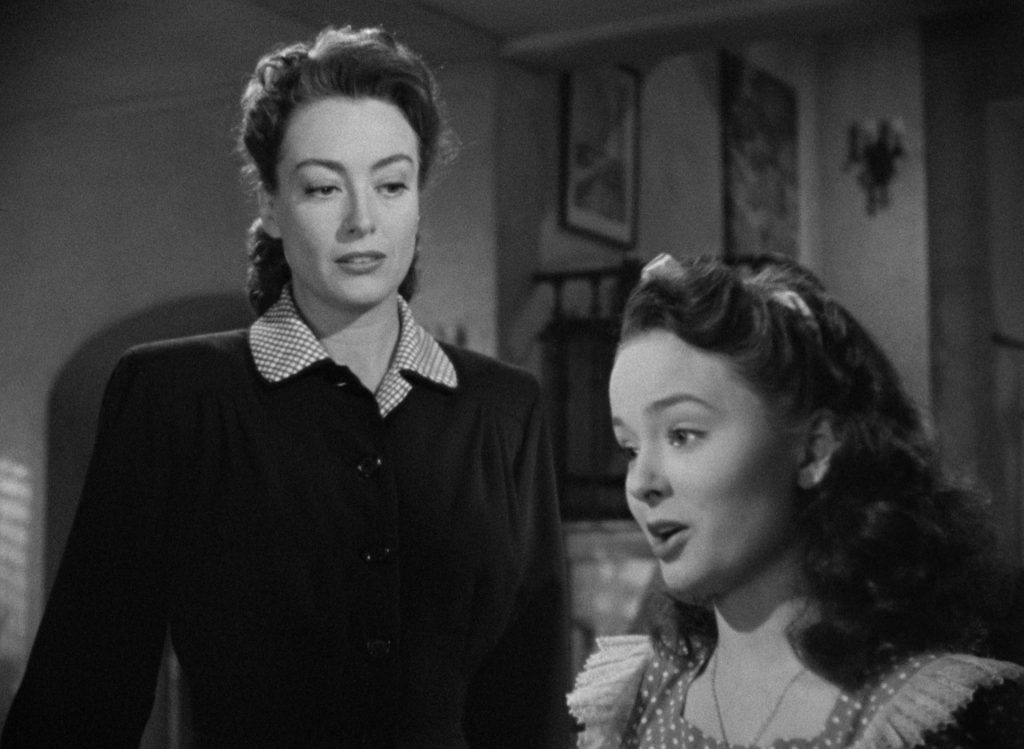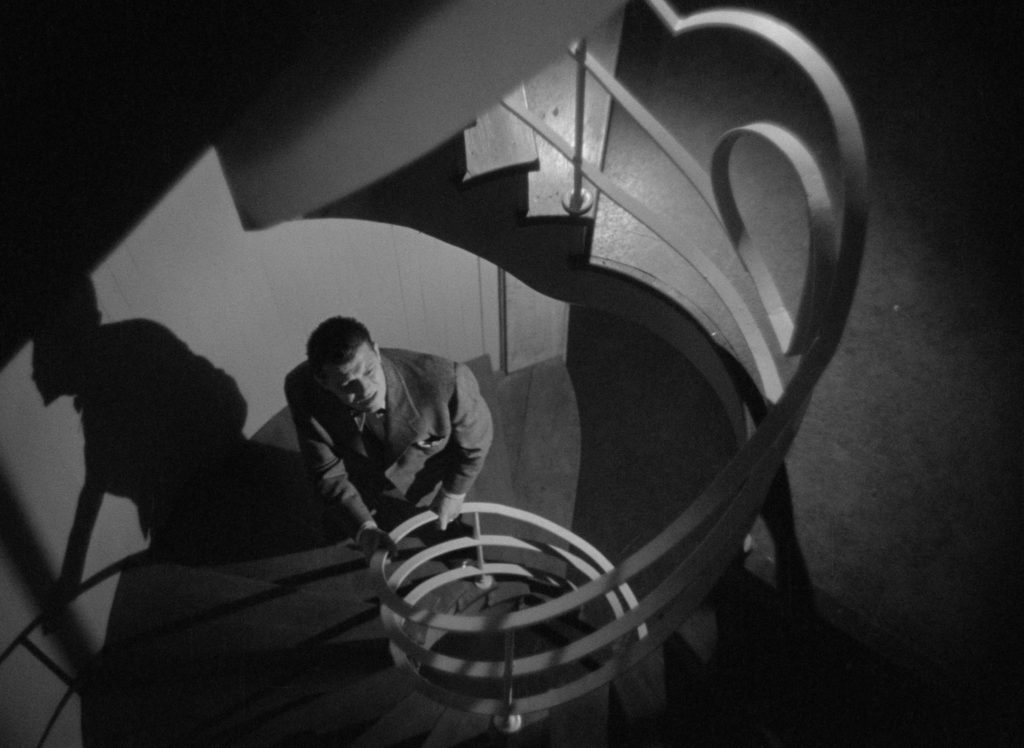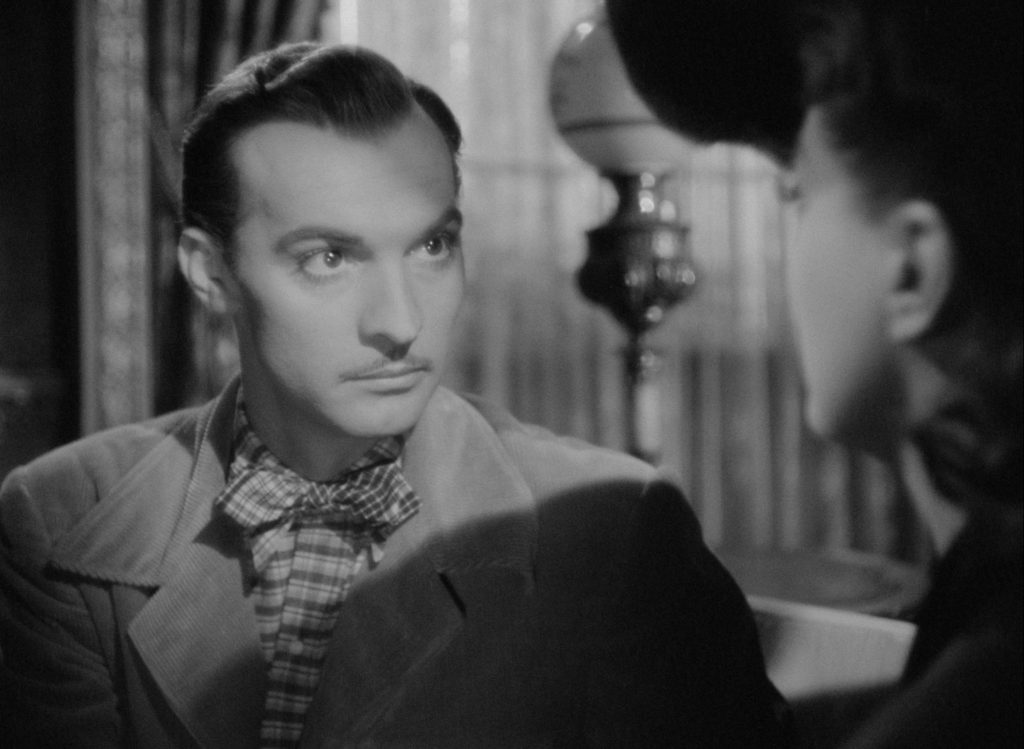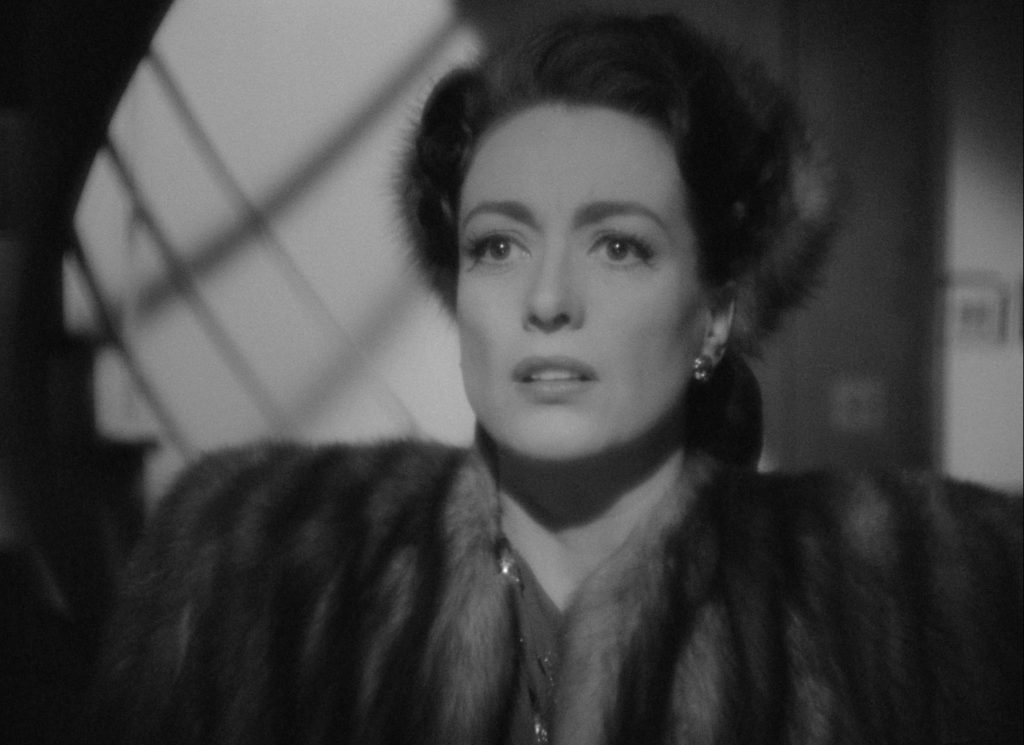Writer: Ranald MacDougall
Cast: Joan Crawford, Ann Blyth, Jack Carson, Zachary Scott, Bruce Bennett, Jo Ann Marlowe
Cert: PG
Running time: 111mins
Year: 1945
Film: ![]()
Extras: 
What’s the story: A murder investigation delves deep into the life of Mildred Pierce, a woman who has struggled for years to provide a better life for her children.
What’s the verdict: An irresistible puzzle, wrapped inside in a 1940s Woman’s Film and garbed in film noir finery, Mildred Pierce may be 77 years old, but she’s aging beautifully.
Based on the novel by James M. Cain, famed for works such as The Postman Always Rings Twice and Double Indemnity, and directed by Casablanca helmer Michael Curtiz, the movie nonetheless belongs to Joan Crawford.
Curtiz hated the idea of casting Crawford, championing instead Barbara Stanwyck, who a year earlier had starred in Billy Wilder’s adaptation of Double Indemnity and whose 1937 Stella Dallas shares surface plot similarities to Mildred Pierce. Crawford, once the Queen of Hollywood, even had to submit to a screen test to prove she was right for the role.
But, the tenacity and stellar work resulted in her only Best Actress Oscar. Moreover, she is the anchor in a film more formally daring than is often recognised.
Opening with a literal bang, a dapper man is shot in a plush beach house, uttering “Mildred” before expiring. Over the next twenty minutes Mildred will contemplate suicide on a pier before a passing policeman sends her packing (in a scene paid homage in Brian De Palma’s The Untouchables) and attempt to frame an associate for the murder.
The audience is dropped in at the beginning with only the titular character their guide, questions piling on questions and Curtiz refusing to toss out easy exposition, a sign of his confidence in Ranald MacDougall’s dynamite script.
A full twenty minutes pass before Mildred is taken in for questioning and the first flashback occurs.
Mildred Pierce is the archetypal woman’s film, brimming with motifs such as domestic issues, mother-daughter relationships and self-sacrifice. Particularly self-sacrifice. Everything told through the eyes of a magnetic female protagonist.
A staple of cinema since the silent days and core elements present in films as diverse as Dancer in the Dark, Brimstone, Jackie and HBO’s Mildred Pierce mini-series, the Woman’s Film’s zenith was the 30s and 40s. Particularly during World War 2, when women were needed for jobs typically performed by the men now off fighting. This new social dynamic added a fresh angle addressed in this film.
Mildred has ambitions for daughters Veda (Blyth) and Kay (Marlowe) beyond the middle-class suburbia in which she shares a loveless marriage with dull husband Bert (Bennett). Accomplished in the kitchen she sets her sights on opening restaurants to fund ballet and music lessons for her girls, plus the finery with which the steely-eyed Veda must be adorned.
Helping Mildred is real-estate broker and friend Wally (Benny Hill lookalike Carson), while cash poor socialite Monty (Scott) sells Mildred property for her first restaurant then eyes her growing empire.
As her wealth increases Mildred discovers life becomes no easier, her inability to refuse Veda’s demands transforming the materialistic young woman into a poisonous monster.
Curtiz uses noir trappings to shroud in mystery that opening murder (itself an invention for the film and not present in Cain’s source novel). High key lighting and deep shadows throw actions and motivations into impenetrable murk and early shot of a character barreling up a spiral staircase is a subtle nod to the audience’s journey through the labyrinthine plot.
The film grows lighter as facts are uncovered, but this is truth revealed under the glare of a police light, scenes having a stark visual quality. Curtiz directs at the top of his game, blending locations, complex studio sets, matte paintings and knockout performances to create an evocative portrait of mid-40s LA.
Enduring the hardship is Crawford’s Mildred, the actress’ compassionate eyes, strong-jaw and sad smile conveying years of worry and tragedy, punctuated by fleeting moments of happiness.
Ironic to recall Crawford was a tyrannical mother to her adopted children. Here the demon is Ann Blyth’s Veda, a caustic creation who, in a nice touch, typically deigns to look at her mother only when pouring scorn on her. Their staircase confrontation is most well-known, but an earlier scene of the manipulative Veda forcing Mildred to admit she’s been waitressing to earn money is a standout moment of elegant cruelty.
The high-waist trousered men are pawns in this mother-daughter struggle, but rise above mere background decoration. Carson’s Wally may be a chancer, but he has a conniving intelligence that makes him less than lovable but far more interesting. Veda aside, the film’s other boo-hiss villain is Scott’s Monty, a professional cad who happily tells Mildred, “You work, I loaf.”
Alongside familial betrayal, Mildred Pierce includes then-risqué topics such as affairs, divorce and unwanted pregnancy, all rooted in character and story, and all punished which is why the Hays Code didn’t scissor the film.
In a discussion on Criterion’s excellent Blu-ray, critics Molly Haskell and Robert Polito compare Mildred Pierce’s structure to Citizen Kane: the opening death and single word of dialogue both instigating investigations into the central character.
If people want to call Mildred Pierce the female Citizen Kane, we’re happy with that.
Extras:
Criterion’s Blu-ray release bestows stellar treatment on this classic film. The image is sparkling for a film its age and the special features place the film in context.
Film critics Molly Haskell and Robert Polito reappraise the film they initially dismissed during the 1970s when it seemed the epitome of old Hollywood. In twenty minutes they frame Mildred Pierce within Crawford’s career, the period it was made, compare it to the book and the HBO mini-series and discuss its film noir and Woman’s Film legacy. Erudite and engaging, Haskell and Polito should re-team to give other classical Hollywood movies this treatment.
An excerpt from a 1970 edition of The David Frost Show features Joan Crawford talking about her experiences on Mildred Pierce and being censored for saying Clark Gable “had balls.” Showing her both tremulous and fierce, it’s an example of both sides of her persona featured in Joan Crawford: The Ultimate Movie Star, the longest extra included.
This feature-length 2002 documentary includes distubring recounts from Christine Crawford, the star’s adopted daughter who penned tell-all memoir Mommie Dearest about her abusive mother.
The documentary attempts to place Crawford’s behaviour within the dirt-poor family she was born into, a hard childhood, and the merciless business called show. Plus, the abusive relationships she entered with men, journeyman director Vincent Sherman cheerily recounting how an argument between them ended with him hitting her. This is no whitewash of Crawford, rather a rounded account of a Hollywood legend arguably now forgotten.
A 1969 Today show interview with James M. Cain is fascinating for his opinions on television violence (he dismisses the idea it inspires real violence), marijuana (not as harmful as alcohol) and cigarettes (they are an affectation to assume the character of a lost soul). The only misstep opinion is his belief that pollution is not a topic the younger generation will take seriously, saying it “doesn’t seem to me like anything they’d get excited about.”
Add in a roughly shot but entertaining 25-minute 2006 interview with Ann Blyth following a screening of Mildred Pierce and Criterion’s release is a fantastic package.
The only key extra we would have liked it an audio commentary analysing the film as a key example of classical Hollywood filmmaking, but devotees and newcomers alike will want this release in the collection.
Rob Daniel
Twitter: rob_a_Daniel
Like this review? Try out The Electric Shadows Podcast available now for subscription on iTunes or here.
[youtube id=”ozf32hrXGiY”]





